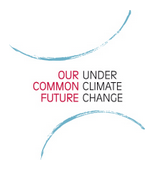"2015 is a critical year for progress.
The window for economically feasible solutions [to climate change] with a reasonable prospect of holding warming to 2°C or less is rapidly closing," according to the outcome statement of the Our Common Future under Climate Change international science conference (CFCC15) held in Paris, France, on 7-10 July 2015.
 10 July 2015: The ‘Our Common Future under Climate Change’ international science conference (CFCC15) attracted almost 2,000 academics from close to 100 countries, the largest gathering of the scientific community in the lead-up to the 21st session of the Conference of the Parties (COP 21) to the UNFCCC. According to the outcome statement of the CFCC15, “2015 is a critical year for progress. The window for economically feasible solutions [to climate change] with a reasonable prospect of holding warming to 2°C or less is rapidly closing.”
10 July 2015: The ‘Our Common Future under Climate Change’ international science conference (CFCC15) attracted almost 2,000 academics from close to 100 countries, the largest gathering of the scientific community in the lead-up to the 21st session of the Conference of the Parties (COP 21) to the UNFCCC. According to the outcome statement of the CFCC15, “2015 is a critical year for progress. The window for economically feasible solutions [to climate change] with a reasonable prospect of holding warming to 2°C or less is rapidly closing.”
CFCC15, which took place in Paris, France, on 7-10 July 2015, reviewed current knowledge and considered potential solutions for adaptation and mitigation in the context of sustainable development, conservation, equity and cultural diversity. Participants sought to inform the UN climate talks and debate the future research agenda.
UN Secretary-General Ban Ki-moon’s opening remarks, delivered by World Meteorological Organization (WMO) Secretary-General Michel Jarraud, underlined that the “emissions and adaptation gaps” will need to be partially bridged by filling holes in knowledge and technology, largely through scientific progress.
The outcome statement affirms the scientific community’s commitment to researching solutions, raising awareness and supporting the policy process. It further notes that “Science is a foundation for smart decisions at COP21 and beyond. Solving the challenge of climate change requires ambition, dedication, and leadership from governments, the private sector, and civil society, in addition to the scientific community.”
The statement was endorsed by the CFCC15 Scientific Committee, the Chairs of the Organizing and High-Level Committees, and the organizers of the conference, namely: the UN Educational, Scientific and Cultural Organization (UNESCO); Future Earth; and the International Council for Science (ICSU). The conference was also supported by French research institutions and the Government of France.
The statement is divided into: “The Solution Space,” which underscores the costs of delaying mitigation action, calls for pricing carbon and emphasizes mitigation co-benefits; and “The Problem Space,” which stresses that warming of the climate system is unequivocal and changes to the climate have “contributed to many kinds of extremes, including heat waves, heavy rain, wildfires, droughts, and decreased snow and ice.”
According to the organizers, experts from the physical and social sciences presented 165 sessions covering ways to limit and manage change. Commenting on the outcomes, UNFCCC Executive Secretary Christiana Figueres said, “The world’s leading researchers on climate have underlined the crucial importance of nations focusing on a long term goal–call it zero emissions, net zero or climate neutrality.” She added that COP 21 must send a clear signal that the world will undertake “a steep and deep decline” in emissions by the 2050-2100 period.
On the eve of the conference, the Oceans 2015 Initiative launched a publication, titled ‘Contrasting Futures for Ocean and Society from Different Anthropogenic CO2 Emissions Scenarios.’ The paper compares climate change impacts on marine systems under two emissions scenarios. It emphasizes the impacts already observed in the oceans, such as increased ocean temperature, acidification and sea-level rise. The paper also highlights the oceans’ role in absorbing excess warming, capturing carbon dioxide (CO2) emissions and collecting water from melting ice. [CFCC15 Website] [UN Secretary-General’s Opening Remarks] [CFCC15 Outcome Statement] [CFCC15 Press Release] [UNFCCC Press Release, 6 July 2015] [UNFCCC Press Release, 10 July 2015] [ICRAF Press Release] [Secretariat of the Pacific Community (SPC) Press Release]